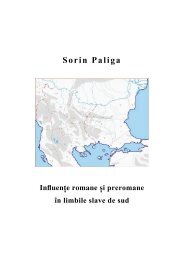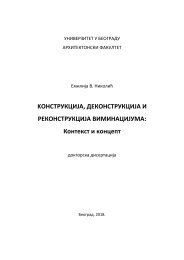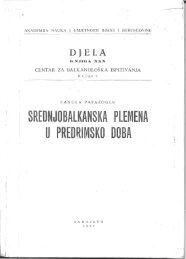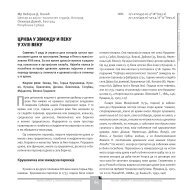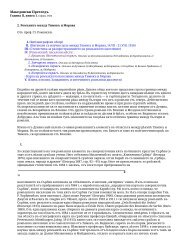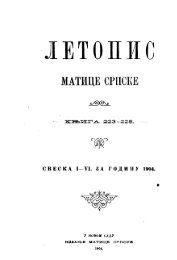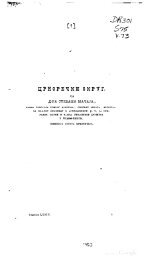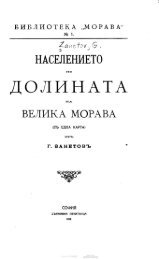The Construction of National Identity and its Challenges in Post-Yugoslav Censuses
You also want an ePaper? Increase the reach of your titles
YUMPU automatically turns print PDFs into web optimized ePapers that Google loves.
<strong>The</strong> <strong>Construction</strong> <strong>of</strong> <strong>National</strong> <strong>Identity</strong> <strong>and</strong> <strong>its</strong> <strong>Challenges</strong> 883<br />
Although most post-<strong>Yugoslav</strong> states <strong>of</strong>ten sought to break with the <strong>Yugoslav</strong>ia legacy,<br />
census categories rema<strong>in</strong>ed largely unchanged. Unlike earlier critical junctures—the establishment<br />
<strong>of</strong> nation-states <strong>and</strong> the two world wars—that brought ruptures <strong>in</strong> the census<br />
categories, the dissolution <strong>of</strong> <strong>Yugoslav</strong>ia occurred along exist<strong>in</strong>g <strong>in</strong>ternal borders <strong>and</strong> even<br />
the new states <strong>in</strong>herited the <strong>in</strong>stitutions <strong>and</strong> the <strong>in</strong>ternational patterns <strong>of</strong> the republics.<br />
While the states reconfigured the hierarchy <strong>of</strong> nations, grant<strong>in</strong>g greater power to the dom<strong>in</strong>ant<br />
nation <strong>in</strong> new constitutions (especially <strong>in</strong> Croatia <strong>and</strong> Macedonia), no successor state<br />
denied recognition to m<strong>in</strong>orities (Jović, 2011). In the first post<strong>in</strong>dependence census held<br />
<strong>in</strong> the early 2000s, the old categories largely rema<strong>in</strong>ed, with m<strong>in</strong>or shifts. Thus, follow<strong>in</strong>g<br />
a decision <strong>of</strong> Muslim <strong>in</strong>tellectuals <strong>in</strong> Bosnia <strong>and</strong> Herzegov<strong>in</strong>a <strong>in</strong> 1993, the name <strong>of</strong> the<br />
Muslims changed to Bosniaks to create a greater dist<strong>in</strong>ction for religious identity <strong>and</strong> also<br />
assert greater ownership over the Bosnian state (Dimitrovova, 2001). All post-<strong>Yugoslav</strong><br />
states followed this shift by allow<strong>in</strong>g their citizens to identify as Bosniaks, even if not all<br />
Muslims followed suit.<br />
<strong>The</strong> new nation-states that replaced <strong>Yugoslav</strong>ia <strong>of</strong>ten <strong>in</strong>troduced new identity categories,<br />
result<strong>in</strong>g <strong>in</strong> the <strong>of</strong>ten-deliberate fragmentation <strong>of</strong> m<strong>in</strong>orities. In the 1990s, highlight<strong>in</strong>g<br />
smaller m<strong>in</strong>orities also served to downplay larger communities. Serbia, under Milošević,<br />
recognized the Egyptian <strong>and</strong> Ashkali m<strong>in</strong>orities dist<strong>in</strong>ct from Roma, as well as the Slav<br />
Muslim Gorani <strong>in</strong> Kosovo <strong>and</strong> Bunjevci, <strong>and</strong> the Catholic South Slavs like the Croats <strong>in</strong><br />
the northern prov<strong>in</strong>ce <strong>of</strong> Vojvod<strong>in</strong>a.<br />
Subsequently, as we shall see <strong>in</strong> more detail <strong>in</strong> the next sections, census categories<br />
are shaped by public debate, <strong>in</strong> addition to historical patterns. Political parties, religious<br />
leaders, <strong>and</strong> NGOs have taken an active part <strong>in</strong> both seek<strong>in</strong>g to determ<strong>in</strong>e the categories,<br />
<strong>and</strong> subsequently <strong>in</strong> mobiliz<strong>in</strong>g citizens to make particular identity choices.<br />
F<strong>in</strong>ally, <strong>in</strong>ternational st<strong>and</strong>ards <strong>and</strong> the monitor<strong>in</strong>g <strong>of</strong> the European Union have also<br />
shaped the conduct <strong>of</strong> the census, <strong>in</strong>clud<strong>in</strong>g the construction <strong>of</strong> categories. In part, this can<br />
be attributed to the European Union’s pr<strong>of</strong>essional st<strong>and</strong>ards <strong>and</strong> networks <strong>of</strong> statistical<br />
<strong>of</strong>fices, <strong>and</strong> to the external assistance <strong>and</strong> f<strong>in</strong>ancial support provided to the census <strong>in</strong><br />
the region by the European Union. E.U. engagement has been particularly significant, as<br />
the European Union has a particular <strong>in</strong>terest <strong>in</strong> support<strong>in</strong>g the development <strong>of</strong> reliable<br />
statistics <strong>in</strong> potential member states. As a result, it has provided expertise <strong>and</strong> established<br />
the Technical Coord<strong>in</strong>ation Group (TGC) ahead <strong>of</strong> the censuses <strong>in</strong> 2009, with census<br />
<strong>of</strong>fices <strong>in</strong> all countries <strong>of</strong> the Western Balkans. <strong>The</strong> European Union <strong>and</strong> United Nations<br />
not only provided advice on the censuses, but also established monitor<strong>in</strong>g missions at the<br />
request <strong>of</strong> the governments <strong>in</strong> Montenegro, Kosovo, Macedonia, <strong>and</strong> Bosnia. In Kosovo,<br />
with a strong <strong>in</strong>ternational presence <strong>and</strong> a controversial census due to the contested nature<br />
<strong>of</strong> Kosovo’s statehood, the E.U. <strong>of</strong>ficial <strong>in</strong> charge <strong>of</strong> the census met with the prime m<strong>in</strong>ister<br />
Hashim Thaçi <strong>and</strong> the International Monitor<strong>in</strong>g Mission (composed <strong>of</strong> E.U. <strong>and</strong> U.N.<br />
<strong>of</strong>ficials) to publicly declare the questions posed on national identity <strong>and</strong> religion to be <strong>in</strong><br />
l<strong>in</strong>e with <strong>in</strong>ternational st<strong>and</strong>ards (Collaku, 2011). <strong>The</strong> approach taken by the European<br />
Union, which had funded <strong>and</strong> observed the first post-<strong>Yugoslav</strong> census <strong>in</strong> Macedonia <strong>in</strong><br />
1994, focused on the census as a neutral statistical exercise. Viktor Friedman noted the gap<br />
between the <strong>in</strong>ternational observers’ technical underst<strong>and</strong><strong>in</strong>g <strong>of</strong> the census <strong>and</strong> the deeply<br />
political <strong>and</strong> contested significance it held domestically (1994:84).<br />
Macedonia <strong>and</strong> Kosovo’s constitutions both conta<strong>in</strong> provisions l<strong>in</strong>k<strong>in</strong>g political representation<br />
to population share <strong>and</strong> group rights, <strong>and</strong>, as a result, there is clearly an <strong>in</strong>ternationally<br />
sanctioned constitutional logic to determ<strong>in</strong><strong>in</strong>g the citizens’ national identity. Generally<br />
speak<strong>in</strong>g, consider<strong>in</strong>g the <strong>in</strong>ternational mediation <strong>of</strong> the constitutional arrangements <strong>in</strong><br />
Bosnia, <strong>in</strong>ternational <strong>and</strong> E.U. st<strong>and</strong>ards on census neither require questions ask<strong>in</strong>g about






